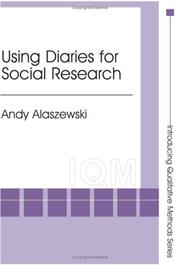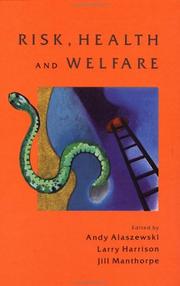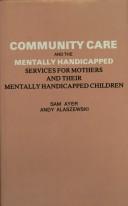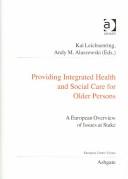| Listing 1 - 10 of 10 |
Sort by
|

ISBN: 0761972900 0761972919 9780761972914 0857020218 9786611251369 1281251364 1847877281 9780761972907 Year: 2006 Publisher: London Sage
Abstract | Keywords | Export | Availability | Bookmark
 Loading...
Loading...Choose an application
- Reference Manager
- EndNote
- RefWorks (Direct export to RefWorks)
The author considers the analysis of diaries as a distinctive research technique in its own right. He recognises the increased interest in and relevance of diary methodology within social research teaching.
Social sciences --- Diaries --- Sciences sociales --- Journaux intimes --- Methodology --- Research --- History and criticism --- Méthodologie --- Recherche --- Histoire et critique --- #SBIB:303H527 --- Analyse van historische en persoonlijke documenten --- #SBIB:303H30 --- Kwalitatieve methoden: algemeen --- Qualitative methods in social research --- Diaries. --- Methodology. --- Recherche.
Book
ISBN: 0709905645 Year: 1986 Publisher: London Croom Helm
Abstract | Keywords | Export | Availability | Bookmark
 Loading...
Loading...Choose an application
- Reference Manager
- EndNote
- RefWorks (Direct export to RefWorks)
Mental retardation facilities --- People with disabilities --- People with mental disabilities --- Hospitals, Psychiatric --- Mental Health Services --- Patients --- Administration --- Functional assessment --- Institutional care --- organization & administration --- classification --- Jane Eagle Hospital --- United Kingdom.

ISBN: 0335198694 Year: 1998 Publisher: Buckingham Open university press
Abstract | Keywords | Export | Availability | Bookmark
 Loading...
Loading...Choose an application
- Reference Manager
- EndNote
- RefWorks (Direct export to RefWorks)
Medical policy --- Public health --- Public welfare --- Risk --- Great Britain --- Social policy.
Book
ISBN: 9780857020215 Year: 2006 Publisher: London : SAGE,
Abstract | Keywords | Export | Availability | Bookmark
 Loading...
Loading...Choose an application
- Reference Manager
- EndNote
- RefWorks (Direct export to RefWorks)
The author considers the analysis of diaries as a distinctive research technique in its own right. He recognises the increased interest in and relevance of diary methodology within social research teaching.
Social sciences --- Diaries. --- Research --- Methodology.
Book
ISBN: 9780745641737 9780745641744 0745641733 0745641741 Year: 2012 Publisher: Cambridge Polity
Abstract | Keywords | Export | Availability | Bookmark
 Loading...
Loading...Choose an application
- Reference Manager
- EndNote
- RefWorks (Direct export to RefWorks)
Sociology of health --- Social policy --- United Kingdom --- Health Policy --- Policy Making --- Medical policy --- Politique sanitaire --- Grande-Bretagne --- #SBIB:316.334.3M50 --- #SBIB:35H436 --- Organisatie van de gezondheidszorg: algemeen, beleid --- Beleidssectoren: welzijn, volksgezondheid en cultuur

Abstract | Keywords | Export | Availability | Bookmark
 Loading...
Loading...Choose an application
- Reference Manager
- EndNote
- RefWorks (Direct export to RefWorks)
People with mental disabilities --- Community Mental Health Services --- Family --- Intellectual Disability --- Government policy --- Services for --- England.
Book
ISBN: 9781447365273 1447365283 1447365275 9781447365242 9781447365259 1447365240 Year: 2023 Publisher: Bristol : Policy Press,
Abstract | Keywords | Export | Availability | Bookmark
 Loading...
Loading...Choose an application
- Reference Manager
- EndNote
- RefWorks (Direct export to RefWorks)
This book provides an accessible guide to the key elements of risk in policy making and shows how its use and misuse has shaped policy makers' responses to the COVID-19 pandemic in a range of countries.
MEDICAL / Health Policy. --- COVID-19 Pandemic, 2020 --- -Risk management --- Political planning. --- Government policy. --- Political planning --- COVID-19 Pandemic, 2020-2023 --- Risk management
Book
Abstract | Keywords | Export | Availability | Bookmark
 Loading...
Loading...Choose an application
- Reference Manager
- EndNote
- RefWorks (Direct export to RefWorks)

ISBN: 0754641961 Year: 2004 Publisher: Aldershot Ashgate
Abstract | Keywords | Export | Availability | Bookmark
 Loading...
Loading...Choose an application
- Reference Manager
- EndNote
- RefWorks (Direct export to RefWorks)
Book

ISBN: 1529745470 Year: 2020 Publisher: London : SAGE Publications Ltd.,
Abstract | Keywords | Export | Availability | Bookmark
 Loading...
Loading...Choose an application
- Reference Manager
- EndNote
- RefWorks (Direct export to RefWorks)
Diary researchers use pre-existing or solicited diaries, documents made up of regular dated entries. Such documents are particularly useful for researchers who would like to observe specific phenomena but are unable to do so because they took place before the research started or are intrinsically difficult to observe. Diaries can also provide ways of accessing voices that are often silenced in public discourses such as those of gay men, members of countercultures, or women. Diaries can be used as a source of data in a variety of research designs, including experimental and survey research that use structured diaries to collect specific data from selected groups as well as interpretive, ethnographic research that examines the ways in which diarists narrate their life and experiences. While the entries in diaries may appear to be accurate records of diarists' observations and reflections, they are shaped by diarists' interests and by social, cultural, and literary conventions. Furthermore, dated entries may not be written at the specified time and may be subsequently edited by the diarist and others. Researchers can respond to such issues by maximising their control over the ways diaries are used and entries made, for example, by carefully selecting diarists and providing them with detailed instructions on how to complete their diaries. An alternative approach is to focus on the underlying structure of diaries and explore why diarists have chosen to keep diaries as well as how they used existing conventions to narrate their stories.
Sociology. --- Anthropology. --- History.
| Listing 1 - 10 of 10 |
Sort by
|

 Search
Search Feedback
Feedback About UniCat
About UniCat  Help
Help News
News